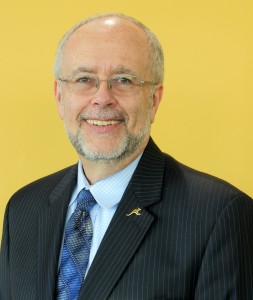 As Dean of the School of Graduate Studies, I want to welcome the new students and the returning graduate students to the 2015-16 academic year. We have almost 4,000 graduate students at UMKC earning degrees from a wide variety of disciplines. We offer more than 50 graduate degrees including masters, education specialist and doctoral degrees. The School of Graduate Studies staff coordinates the policies and regulations of all of the graduate programs and acts as advocates of graduate education and the graduate student.
As Dean of the School of Graduate Studies, I want to welcome the new students and the returning graduate students to the 2015-16 academic year. We have almost 4,000 graduate students at UMKC earning degrees from a wide variety of disciplines. We offer more than 50 graduate degrees including masters, education specialist and doctoral degrees. The School of Graduate Studies staff coordinates the policies and regulations of all of the graduate programs and acts as advocates of graduate education and the graduate student.
Before we start the new year, I want to review some expectations of graduate students. Graduate education is not a simple extension of your undergraduate education. You may find the work more demanding, and more activities may need to be satisfied outside the normal classroom hours. With graduate education comes higher expectations by both your professors and the University of Missouri. Most of you will be engaged in research, whether it is writing research papers for a class or completing a thesis or dissertation. You had some experience in writing at the undergraduate level, but at the graduate level you will likely find writing to be more intense and field specific in terms of style. An item that I want to impress upon you is that your work needs to be ethical.
What do I mean by ethical writing? It needs to be your OWN work and not the work of others. As Dean of the Graduate School I am increasingly made aware of cases involving plagiarism by graduate students. While this occurs at both the undergraduate and graduate levels, it is wrong and unethical behavior. However, it is much more serious when plagiarism has occurred by a graduate student as the expectations are greater. Plagiarism is considered under a much more broad heading termed “academic misconduct”, which includes issues such as cheating on an exam (including providing aid to another student), and sabotage of another student’s work.
The University of Missouri has defined plagiarism as follows in its Collected Rules and Regulations Number 200.010 Standard of Conduct as follows:
“The term plagiarism includes, but is not limited to: (i) use by paraphrase or direct quotation of the published or unpublished work of another person without fully and properly crediting the author with footnotes, citations or bibliographical reference; (ii) unacknowledged use of materials prepared by another person or agency engaged in the selling of term papers or other academic materials; or (iii) unacknowledged use of original work/material that has been produced through collaboration with others without release in writing from collaborators.”
All too often I have received reports of graduate students copying material from other authors or sources verbatim as opposed to using their own words as well as not providing a citation to the material. Moreover, the reports given to me are increasing at the graduate level. Plagiarism will result in sanctions against the student ranging from a warning to expulsion from the university. At a graduate level, it is more common to have students suspended for a fixed period of time or expelled from the university as again there are higher expectations. Not knowing that what you did is considered plagiarism is no excuse for the act.
The School of Graduate Studies has a couple of YouTube videos on examples of plagiarism (https://www.youtube.com/channel/UCtCTEfOFX5sRWd6JyBHDQdQ). Furthermore, there are a number of excellent web sites dealing with plagiarism and how to avoid it. One of my favorites is from the University of North Carolina at Chapel Hill (http://writingcenter.unc.edu/handouts/plagiarism). There are other sources available from other Universities such as Indiana University (http://www.indiana.edu/~wts/pamphlets/plagiarism.shtml) and Purdue University ( https://owl.english.purdue.edu/owl/resource/589/01/) to which you should feel free to refer.
In my previous messages to graduate students, I notified you that there will be a Graduate Student Writing Initiative launched this year. Having a relationship with the UMKC Writing Studio will allow graduate students to receive education on how to avoid plagiarism, and provides opportunities for individual appointments with writing consultants who can provide support for proper citation format in the discipline. However, it does not guarantee that plagiarism will not occur, as in the final analysis of ethical behavior is the responsibility of the individual. When I talk to my own students about this subject, I always give them two pieces of advice: explain the ideas or works of others in your own words (not paraphrased) and include the citation(s) even if you doubt it is needed. You will find that you will learn more and be much more successful in your career.
